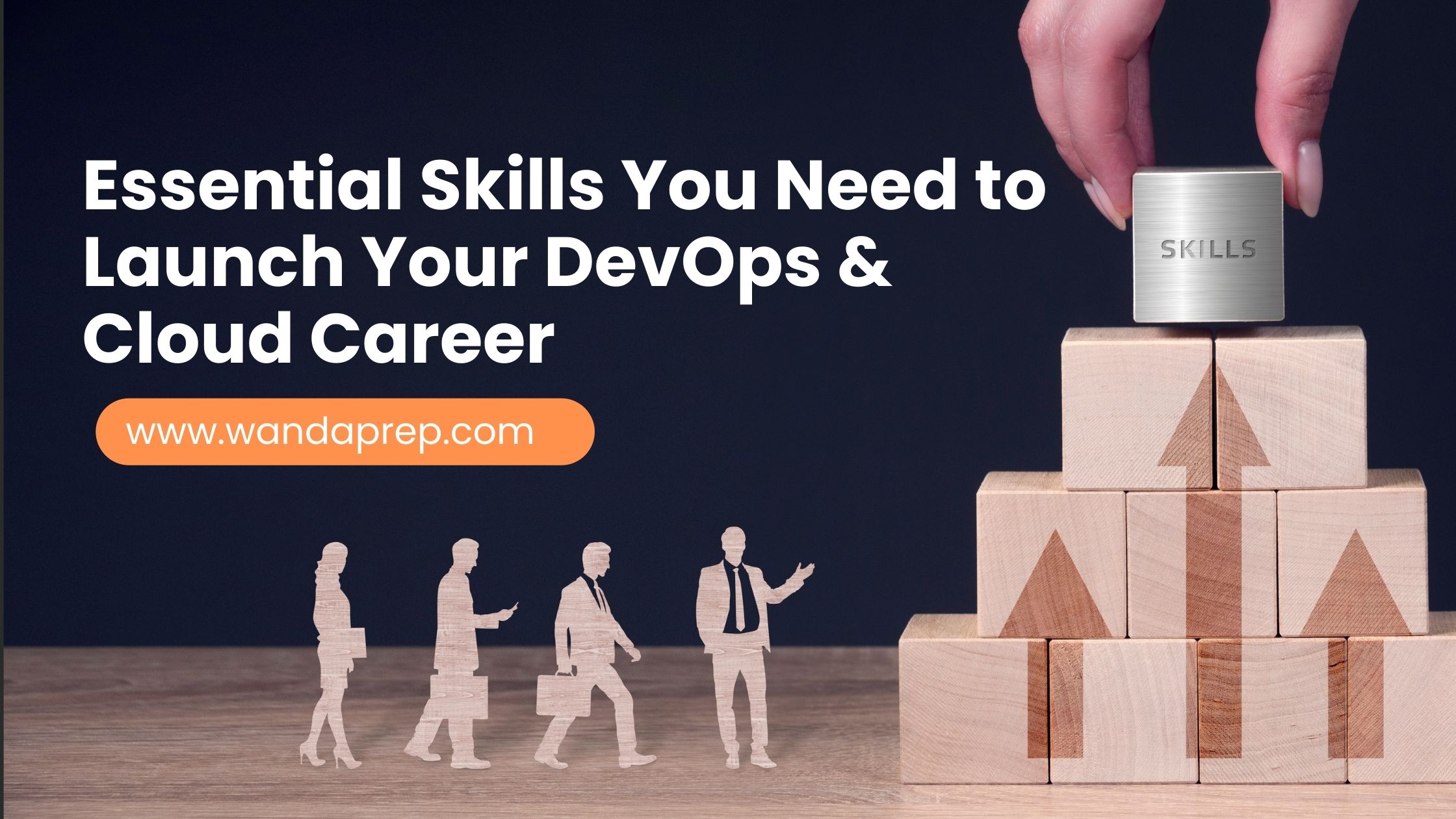
The world of technology is constantly evolving, and the need for skilled professionals to bridge the gap between development and operations is stronger than ever. Enter DevOps Engineers – the IT rockstars who are revolutionizing software delivery with their expertise in both DevOps and Cloud technologies.
If you’re looking for a dynamic and in-demand career path, then DevOps & Cloud might be the perfect fit for you. This exciting field offers the opportunity to work with cutting-edge tools and methodologies, collaborate with talented teams, and play a crucial role in building and deploying the next generation of software applications.
In this blog post, we’ll unveil the essential skills you need to launch a successful DevOps & Cloud career. We’ll explore core DevOps practices, dive deep into Cloud computing fundamentals, and uncover the soft skills that will make you a valuable asset in any team. Whether you’re a seasoned IT professional or just starting your tech journey, this guide will equip you with the knowledge to take the next step towards becoming a DevOps Engineer.
Technical Skills

Core DevOps Skills
Version Control Systems (VCS)
The foundation of any successful DevOps practice is a robust Version Control System (VCS). Tools like Git allow developers and operations teams to track changes in code, collaborate seamlessly, and revert to previous versions if needed. Core VCS concepts like branching enable creating isolated workspaces for features or bug fixes, while merging integrates these branches back into the main codebase. VCS also provides a clear history of changes, allowing teams to identify who made what modifications and when.
Configuration Management (CM)
Manually configuring servers and infrastructure can be time-consuming and error-prone. Configuration Management (CM) tools like Ansible, Chef, and Puppet come to the rescue by automating the provisioning and configuration of infrastructure across various environments. These tools define the desired state of a system – software packages to be installed, user accounts to be created, etc. – and ensure all servers adhere to this configuration, leading to consistency and repeatability.
Continuous Integration & Delivery (CI/CD)
Gone are the days of lengthy software delivery cycles. Continuous Integration & Delivery (CI/CD) streamlines the process by automating several stages: code is automatically built, tested, and deployed after every change. This continuous feedback loop allows for faster bug detection and resolution, leading to higher quality and more reliable software releases. Popular CI/CD tools like Jenkins and GitLab CI/CD integrate seamlessly with VCS and other DevOps tools to orchestrate this automated pipeline.
Scripting Languages
DevOps is all about automation, and scripting languages like Python and Bash are essential tools in this arsenal. Scripting allows you to automate repetitive tasks, interact with systems programmatically, and build custom tools to streamline DevOps workflows. Whether it’s deploying applications, provisioning servers, or collecting data for monitoring, scripting skills empower you to solve problems efficiently and free yourself from manual drudgery.
Cloud Computing Skills
Cloud Fundamentals
The cloud revolution has transformed how we access and utilize computing resources. Understanding core cloud computing concepts is essential for any DevOps professional. There are three main service models offered by cloud providers:
- Infrastructure as a Service (IaaS): In this model, the cloud provider offers virtualized computing resources like servers, storage, and networking. You have full control over the operating system and configurations, providing maximum flexibility. Popular IaaS offerings include Amazon EC2 instances, Microsoft Azure Virtual Machines, and Google Compute Engine (GCE) instances.
- Platform as a Service (PaaS): PaaS goes a step further by providing a platform for developing, deploying, and managing applications. The cloud provider takes care of the underlying infrastructure, allowing you to focus on your application code. Examples of PaaS offerings include AWS Elastic Beanstalk, Microsoft Azure App Service, and Google App Engine.
- Software as a Service (SaaS): With SaaS, you access software applications directly over the internet without managing any infrastructure or platform. This model is ideal for readily available business applications like CRM, email, or productivity tools. Popular SaaS examples include Salesforce, Microsoft Office 365, and Google Workspace.
Leading cloud providers include Amazon Web Services (AWS), Microsoft Azure, and Google Cloud Platform (GCP). Each offers a comprehensive suite of cloud services that cater to various needs.
Cloud Services
Cloud providers offer a wide range of services beyond just compute resources. These services are instrumental for DevOps professionals:
- Storage: Cloud storage solutions like Amazon S3, Azure Blob Storage, and Google Cloud Storage provide scalable and reliable storage for application data, backups, and archives.
- Databases: Managed database services like Amazon RDS, Azure SQL Database, and Google Cloud SQL offer a variety of database options (e.g., relational, NoSQL) that can be easily provisioned and scaled to meet application requirements.
- Networking: Cloud providers offer robust networking services to connect your cloud resources and applications securely. These services include virtual networks, firewalls, and load balancers.
Focusing on services relevant to DevOps, like managing virtual machines, storage, and databases in the cloud, will be crucial for your skillset.
Infrastructure as Code (IaC)
Manually configuring cloud infrastructure can be error-prone and time-consuming. Infrastructure as Code (IaC) tools like Terraform and AWS CloudFormation come to the rescue. These tools allow you to define your cloud infrastructure using code, ensuring consistency, repeatability, and easier management. IaC scripts specify the desired state of your infrastructure (e.g., what virtual machines need to be created, what storage needs to be provisioned), and the IaC tool automatically provisions and configures the resources in the cloud. This approach not only saves time and effort but also enables version control and easier collaboration within DevOps teams.
Additional Tools and Technologies
The DevOps landscape is constantly evolving, and there are numerous other tools and technologies that might be relevant depending on the specific role and organization. Here are a few examples:
- Containerization: Technologies like Docker and Kubernetes enable packaging applications with their dependencies into standardized units called containers. This allows for consistent and portable deployments across different environments.
- Monitoring: Keeping a close eye on the health and performance of your applications and infrastructure is crucial. Monitoring tools like Prometheus and Grafana collect and visualize data from various sources, allowing DevOps teams to identify and troubleshoot issues proactively.
- Infrastructure as Service (IaaS) Security: Security is paramount in the cloud. Understanding and implementing IaaS security best practices, such as access control, encryption, and vulnerability management, is essential for DevOps professionals to ensure the security and compliance of cloud infrastructure.
Soft Skills

The world of DevOps isn’t just about technical prowess. Soft skills are equally important for success in this collaborative and fast-paced environment. Here are three key soft skills to cultivate:
Communication and Collaboration
DevOps engineers act as a bridge between development and operations teams. Clear and concise communication is essential to ensure everyone is aligned on project goals, understand deployment procedures, and can effectively troubleshoot issues. Collaboration is also key – working seamlessly with developers, operations staff, and stakeholders fosters a culture of shared responsibility and efficient problem-solving.
Problem-Solving and Analytical Thinking
Things don’t always go according to plan. When applications malfunction or deployments fail, DevOps engineers need to be adept at troubleshooting. Strong analytical thinking skills allow you to dissect problems, analyze logs and metrics, and identify the root cause of the issue. This skillset, combined with a methodical approach, is crucial for resolving complex technical challenges and ensuring smooth system operation.
Adaptability and Continuous Learning
The tech industry is constantly evolving, and the DevOps landscape is no exception. New tools, technologies, and best practices emerge all the time. DevOps professionals who thrive in this environment possess a strong sense of adaptability and a commitment to continuous learning. This means staying up-to-date with industry trends, exploring new technologies, and actively seeking opportunities to expand your skillset. By embracing continuous learning, you’ll ensure your skills remain relevant and valuable in the ever-changing world of DevOps and Cloud computing.
Conclusion
The world of DevOps and Cloud computing offers a dynamic and rewarding career path. In this post, we explored the essential skills you need to succeed, including core DevOps practices like version control and CI/CD, along with in-demand Cloud computing knowledge. We also highlighted the importance of soft skills like communication and problem-solving.
Are you ready to take the first step towards becoming a DevOps Engineer? Wanda Prep offers comprehensive DevOps and Cloud training programs designed to equip you with the skills and knowledge you need to land your dream job.
Don’t forget to subscribe to our blog or follow us on social media for more valuable tech career resources and insights from industry experts. We’ll be here to guide you on your path to a successful career in the exciting world of technology.
